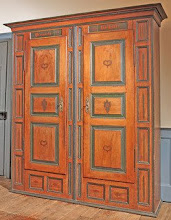We've talked about this before, but we are continually confronted with the issue, so we thought it worth putting out there for discussion: at what point did the antiques that people have hunted, loved, and lived with turn into mere dollar signs? More and more, we are talking to folks who tell wonderful stories of their decades of collecting, of getting to the flea market at 4:00 am and finding that great treasure, or nabbing an overlooked gem at auction. But now that it's time to sell their collections, they become rigidly fixated on money. No one ever told them that the antiques they purchased would be worth anything down the road, and back in the day, they wouldn't have cared...they just loved the stuff and wanted to take it home. Now, however, they are convinced that every antique they purchased should be worth at least what they paid for it, and they sometimes get visibly upset if you point out that the market has changed and this object or that object is less desirable, and therefore less valuable, than it was in 1980.
It almost feels like a betrayal. It's like the hippie who spent the 1960s attending anti-war protests and then shows up to his 30-year high reunion having become a corporate lawyer who doesn't know how to recycle. What happened? When did these antiques that you proclaimed your love for become mere commodities? At what point did your passion for history and art turn into a stubborn desire to squeeze every last penny out of your collection? And with that attitude becoming more and more prevalent, are we really surprised that younger folks aren't developing a love for antiques, a passion for living with historical objects??
Wednesday, June 9, 2010
Subscribe to:
Post Comments (Atom)


7 comments:
Amazing write up! Highly appreciate your writing skills and will look forward for coming posts as well. Have already bookmarked this blog.
Great post altogether. For me Antiques has always been a source of investment for me. I never had personal attachements with any of my antiques and i sold them whenever i felt that i am getting more from the expected price.
LOL, well, i duuno, maybe because that was then & this is NOW, add in a bad economy and you got a situation with boomers down sizing and getting ready to retire. Every dollar counts now where before, it didnt.
Excellent question. Where exactly did any of the greed come from? And where exactly has it left us?
I still love the antiques and art I bought years ago - and it is not about how much they are 'worth' - it is about the values they represent and the inherent beauty they contain.
Ultimately we should collect and invest in art or antiques because they mean something to us on a personal level. So much could be different if it wasn't endlessly about the bottom line.
Keiran--if you consider antiques an investment, then you probably don't consider yourself a collector, right?
Funny thing is, James, is that many of the folks I work with who are so bloody adamant about getting every last penny back from their antiques have plenty of money. They never planned for their collection to be part of their retirement fund, they just developed the belief (somewhere) that antiques hold or increase in value ALL the time, which is, of course, not true.
This attitude has left us with a market where significant numbers of Boomers are holding their collections until "the market returns." Well, the market is rebounding, but I don't know that it'll get to 1998 levels any time soon.
Frankly, I think this over-focus on the bottom line is the cause of many of today's problems, not just in the antiques trade. But that's not a discussion for this forum. :)
There are three things which drive markets - greed, fear and entitlement.
I would rather be around someone who still loves the piece they are selling but even if I were to sell a piece I love I would want to get top dollar. You might be passionate about a car when you buy it but not when you sell it but you still want top dollar.
By the way the 1980's weren't that long ago.I graduated in 1982.
I enjoy your blog.
Post a Comment